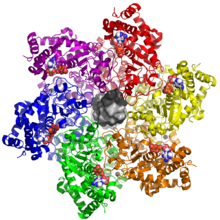
The large tumor antigen (also called the large T-antigen and abbreviated LTag or LT) is a protein encoded in the genomes of polyomaviruses, which are small double-stranded DNA viruses. LTag is expressed early in the infectious cycle and is essential for viral proliferation. Containing four well-conserved protein domains as well as several intrinsically disordered regions, LTag is a fairly large multifunctional protein; in most polyomaviruses, it ranges from around 600-800 amino acids in length. LTag has two primary functions, both related to replication of the viral genome: it unwinds the virus's DNA to prepare it for replication, and it interacts with proteins in the host cell to dysregulate the cell cycle so that the host's DNA replication machinery can be used to replicate the virus's genome. Some polyomavirus LTag proteins - most notably the well-studied SV40 large tumor antigen from the SV40 virus - are oncoproteins that can induce neoplastic transformation in the host cell.[2][3]
- ^ Gai, Dahai; Wang, Damian; Li, Shu-Xing; Chen, Xiaojiang S. (2016-12-06). "The structure of SV40 large T hexameric helicase in complex with AT-rich origin DNA". eLife. 5. doi:10.7554/eLife.18129. ISSN 2050-084X. PMC 5140265. PMID 27921994. (Retracted, see doi:10.7554/eLife.46910, PMID 30942691)
- ^ Topalis, D.; Andrei, G.; Snoeck, R. (February 2013). "The large tumor antigen: A "Swiss Army knife" protein possessing the functions required for the polyomavirus life cycle". Antiviral Research. 97 (2): 122–136. doi:10.1016/j.antiviral.2012.11.007. PMID 23201316.
- ^ An, Ping; Sáenz Robles, Maria Teresa; Pipas, James M. (13 October 2012). "Large T Antigens of Polyomaviruses: Amazing Molecular Machines". Annual Review of Microbiology. 66 (1): 213–236. doi:10.1146/annurev-micro-092611-150154. PMID 22994493.